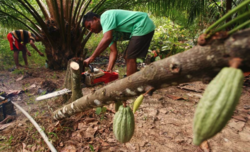
A farmer cuts his cocoa tree to make way for a palm oil plantation in Kolaka in Indonesia's southeast Sulawesi province September 4, 2012. (Photo: COCOA-INDONESIA/ REUTERS/Yusuf Ahmad)
Reuters | 27 November 2023
Indonesia's Astra Agro criticised by green groups over report on grievances
Indonesia's Astra Agro criticised by green groups over report on grievances
JAKARTA, Nov 27 (Reuters) - Environmental groups on Monday criticised Indonesian palm oil producer Astra Agro Lestari (AAL) over a third-party report investigating complaints against its subsidiaries' alleged abuses, saying it failed to investigate key issues.
Astra appointed EcoNusantara to review practices at three of its subsidiaries in March following allegations by environmental groups of human rights abuses and procedural violations.
One of the subsidiaries, PT Agro Nusa Abadi (ANA), was accused of seizing farmers' land in several villages covering approximately 5,000 hectares (12,355.27 acres).
“Despite international condemnation and consumer goods companies suspending sourcing from AAL over abuses in Sulawesi, the investigation did not bother to look at how AAL subsidiaries acquired lands from communities or whether these companies are operating legally," environmental group WALHI's Forest and Plantation Campaign manager Uli Arta Siagian said in a statement.
AAL said that the EcoNusantara report would help stakeholders to understand what has happened on the ground, and that the company would prepare an action plan to implement its recommendations.
"We encourage parties who are interested about solving problems or want to assist the community to be part of this process," said AAL Chief Executive Santosa, adding that the company would provide periodic updates.
The EcoNusantara report found land disputes at ANA's plantation were due to a disagreement over compensation, which at 2.5 million rupiah ($161.39) per hectare was considered too low. The company's verification team also failed to recognise proof of community land ownership rights.
The U.S-based Friends of the Earth and WALHI said the report failed to examine whether AAL and its subsidiaries ever attempted to gain the Free, Prior Informed Consent (FPIC) of impacted communities.
"Ideally FPIC (is) conducted at the beginning of the investment, however two out of three AAL's subsidiaries were established before the FPIC concept was adopted," EcoNusantara Chief Executive Zulfahmi said.
Several consumer goods companies have asked their suppliers to cease buying palm oil from AAL after environmental groups found last year that the company did not obtain consent from local communities before claiming land, that it improperly disposed of waste and cleared areas leading to flooding.
($1 = 15,490.0000 rupiah)













